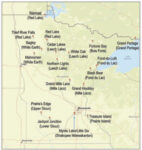
Deb Haaland’s confirmation as secretary of the interior has brought joy and heightened expectations across Indian Country as she assumes her historic leadership as the first Native American cabinet secretary. As her tenure begins, an old truism is at play—personnel is policy. By that standard, Haaland has begun assembling an all-star team of Native American legal scholars and advisers which sets the stage for bold and progressive Indian policy.
The Department of the Interior’s Indian policy is framed by an extensive set of laws, regulations, precedent and internal procedures that sometimes hinder progress and other times allow great flexibility and discretion for positive action. The chief legal officer for the department, the solicitor, maintains vast oversight for decision-making by the secretary, assistant secretary for Indian Affairs, Bureau of Indian Affairs and the attorneys he oversees. The nominee for solicitor, Robert Anderson, a tribal member himself, brings stellar experience to the position as a former counselor to the secretary during the Clinton administration, a law professor and a former practitioner at the Native American Rights Fund. This bodes well for Indian policy since Obama administration Solicitor Hillary Tompkins, also a tribal member, issued landmark opinions in the fee-to-trust arena and oversaw large tribal natural resources settlements.
Secretary Haaland’s chief of staff, Larry Roberts, also a tribal member, served in the Obama administration as a deputy assistant secretary for Indian Affairs and is also an attorney and law professor. Principal Deputy Assistant Secretary for Indian Affairs (ASIA) Bryan Newland may very well be the most qualified deputy ever appointed, having served as the chairman of his Bay Mills Indian Community tribe, practicing as an attorney and law
professor, as well as a counselor during the Obama administration. In addition to Newland, more appointments are being made, including the selection of Ann Marie Bledsoe Downes as principal deputy solicitor for Indian Affairs, who will have a major impact on Indian legal matters.
Already some reversal of prior Trump administration policies have taken place. A good harbinger of these changes is the department’s decision in Mashpee Wampanoag Tribe v. Bernhardt. During the Obama administration, the Department of the Interior took land in trust for the Mashpee Tribe in Massachusetts, the purpose of which was for a casino. The Trump administration reversed this decision but in 2020 a federal district court in Washington, D.C. reversed that decision and remanded the case back to Interior. The Trump administration appealed that decision to the D.C. Circuit Court of Appeals, and while the appeal was pending, the Biden administration came into power. In February 2021, the United States reversed course once again and accepted the district court’s decision that the Mashpee decision should be reviewed. While by no means certain, there is a high likelihood the department will affirm its earlier positive decision for Mashpee and the gaming development will move forward. Elections have consequences, and the Biden election has already led to positive consequences for the Mashpee tribe.
While Secretary Haaland is just beginning her tenure, she has already reversed 17 secretarial orders issued by Trump Secretaries Zinke and Bernhardt. Many of these deal with general environmental issues, but her willingness to reverse prior policy bodes well for Indian tribes. For example, the Trump administration halted the acquisition of land into trust in Alaska, which the Obama administration had cleared. Secretary Haaland and her team are well positioned to reinitiate the taking of land into trust in Alaska.
Likewise, the Trump department solicitor withdrew an earlier opinion issued by Obama department Solicitor Hillary Tompkins regarding how to interpret the Supreme Court’s decision in Carcieri v. Salazar. That decision said a tribe must have been “under federal jurisdiction” in 1934 when the Indian Reorganization Act was passed in order to be eligible for trust land acquisitions. The Tompkins opinion created a very flexible standard that allowed things like census reports and tribal member school attendance to be considered in a Carcieri analysis. Even though that opinion had been confirmed in a number of court decisions, the Trump administration withdrew the opinion and narrowed its scope. While this seesaw approach is detrimental to predictability and credibility of Interior Department decisions, a return to the broader scope of the Carcieri interpretation seems to be ripe for a Biden department decision.
One additional opportunity which Secretary Haaland could enjoy as head of the department is all of the Cares Act Covid relief funding passed in 2020 and 2021. Over $30 billion will go to tribes and cabinet agencies serving tribes, which presents massive opportunities for health care capacity building and general support for tribal government administration. These funds will also bolster the Bureau of Indian Affairs law enforcement, telecommunications capability, food security and infrastructure on reservations. The ability to direct these funds will present Secretary Haaland and Treasury Secretary Janet Yellen immense opportunities to improve living conditions in Indian Country.











